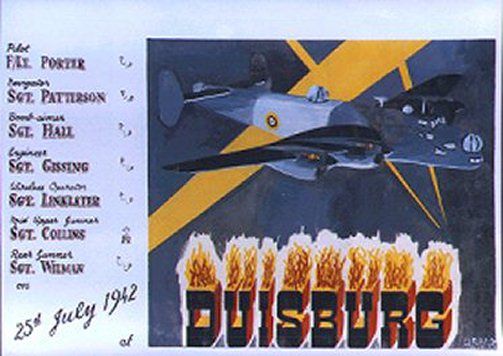 Previous Section |
 Go Back to Chapter Headings |
 Next Section |
Our Modus Operandi for the rest of the march was to escape from a column
during the night and try to scrounge some food or trade a woolen sweater, watch,
etc. for food. We would often, for example, get a loaf of bread, eat half and
trade the other half to our comrades for a watch, some woolen goods or anything
tradable. We would go into a village or town and find the people had little or
no food to trade. It was always women or old people who came to the door. Quite
a few times I can recall elderly people showing us their cupboards which
contained only a few potatoes, turnip or a bit of bread, so they had nothing to
trade. Mem's ability to speak good German made these excursions
possible.
We were getting in desperate condition, health wise. Diarrhea
developed into dysentery. We were filthy and so were our clothes. We were lousy
but seemed to have no fleas so I guess these pests couldn't cohabitate. Food was
very little or non-existent. Sleeping in barns or in the open with only a thin
blanket caused colds and sickness. We continued to see Jews and Russian POW
column's. Both of these groups were worse off than us. I recall passing a column
of Jewish women from some Balkan country. One of our men tossed over a toque or
a scarf to the women. The woman who grabbed it was butt-ended with a rifle by
one of the guards. There was deep snow and it was bitter cold so I don't know
how these women could survive.
Some of the town names I remember were
Gorlitz, Bautzen, Zeitz, Jena, Erfurt and Duderstadt where I was liberated by
the U.S. Army. We swung South quite a bit because we marched for about ten days
through the Carpethian Mountains, actually they were really hills and they
reminded me of the foothills West of Okotoks.
As we marched West and
Spring approached the cold became less of a problem. Dysentery became more of a
problem. If I got a potato I would roast it until it was practically charcoal
and then eat it. I developed a large and very painful sore on one of my heals.
Mem talked one of the guards into letting me ride on the sick wagon for a day.
It would have about six POWs and the guards kit bags on it. There was one
Russian POW who was all puffed up. If he pushed a finger into his flesh the
indent stayed for a long time. The poor fellow was in horrible pain.
 Previous Section |
 Go Back to Chapter Headings |
 Next Section |